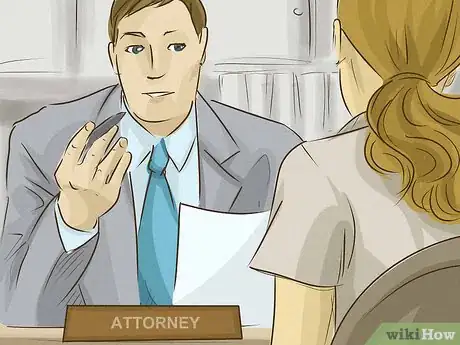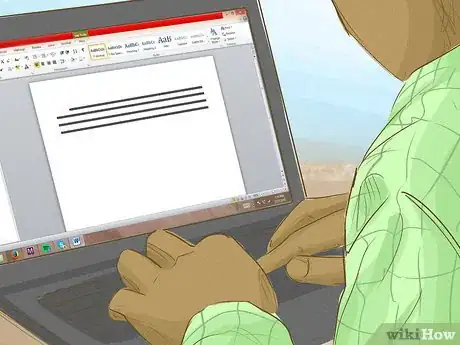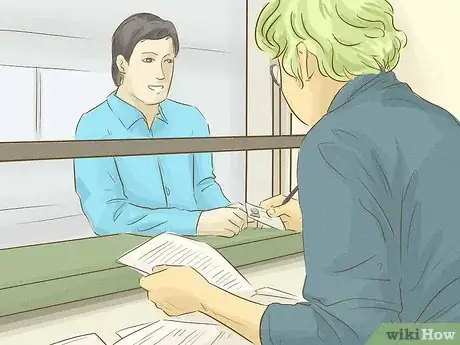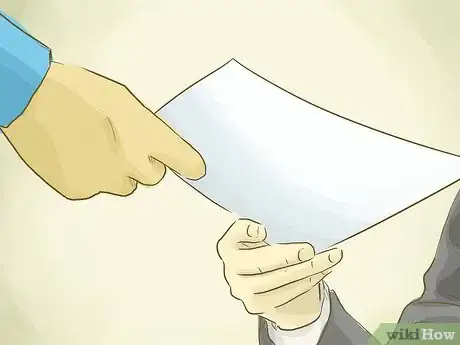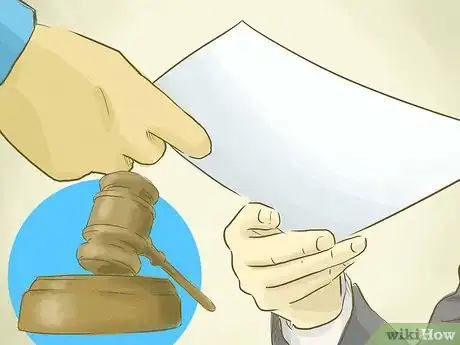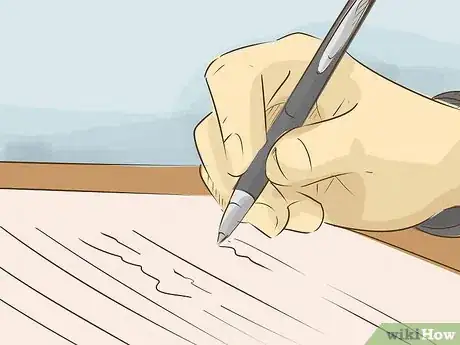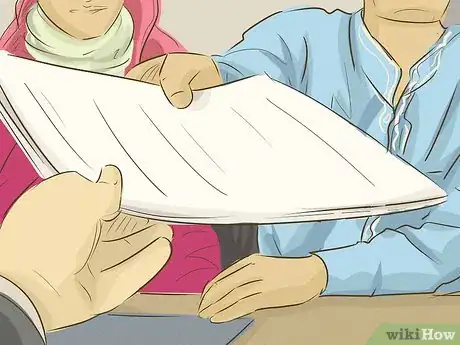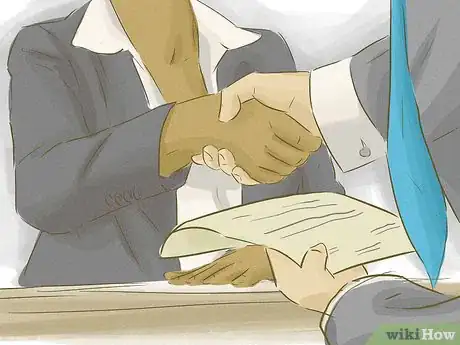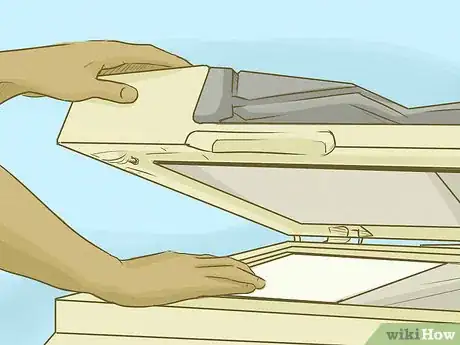This article was written by Jennifer Mueller, JD. Jennifer Mueller is an in-house legal expert at wikiHow. Jennifer reviews, fact-checks, and evaluates wikiHow's legal content to ensure thoroughness and accuracy. She received her JD from Indiana University Maurer School of Law in 2006.
There are 8 references cited in this article, which can be found at the bottom of the page.
This article has been viewed 23,370 times.
When someone dies and has a will, the court will appoint someone as the executor of that person's estate. The executor has the responsibility of paying all of the deceased person's debts and distributing that person's property to the beneficiaries listed in the will. These estate administration matters are done through letters testamentary, which are issued by the probate court. The letters testamentary tell banks and others that the executor has the power to act on behalf of the deceased person.[1]
Steps
Submitting the Will for Probate
-
1Hire an attorney. Many courts offer forms for non-attorneys to complete and handle probate on their own. However, the probate process is extremely complicated. Unless you already have some familiarity with probate, you probably need an attorney to help you.[2]
- If the deceased person had an attorney draw up their will, you might want to start with them. Even though they may not be able to represent you in the probate proceedings, they can offer advice and recommend someone to work with you.
- Most probate attorneys provide a free initial consultation, so it's worth talking to someone even if you ultimately decide to go it alone. Keep in mind that if you're appointed executor, your legal bills will typically be paid by the estate.
- In some courts, if you elect to proceed through probate without an attorney, you're required to give the court notice and provide evidence of your competency to handle things on your own.
-
2Find the original will. Generally, you need the original will (with original signatures) to submit to the court – not a photocopy. Look through the papers of the deceased person. You might also contact any lawyers who worked on the will.[3]
- If the deceased person doesn't have a safe or other secure location where they typically stored important documents, it may be difficult to locate the original will.
- Some courts have additional paperwork and petitions you can file requesting the court allow you to submit a photocopy, if it's all you can find. Get help from an attorney if you have a photocopy but can't locate the original will.
Advertisement -
3Draft a petition to admit the will. This document has different names in different states, but it essentially asks the court to validate the original will that you have found for the deceased person, and appoint an executor to administer that person's estate.[4]
- Some states have more streamlined procedures if the deceased person had relatively few assets.
- In some states you must have the clerk acknowledge the will before you can proceed through the rest of the probate process. In other states, probate is opened at the same time the will is admitted.
-
4Get a certified copy of the death certificate. The certified copy of the death certificate proves the person who wrote the will is legally dead. Get a copy from the vital records office of the state where the person died. This may not be the same as the state where the person lived. [5]
- The CDC has a directory with contact information for the vital records office for every US state and territory. Go to https://www.cdc.gov/nchs/w2w/index.htm and click on the appropriate link.
- If the person died outside the US, contact the consulate or embassy in the country where they died.
-
5Apply for probate. Your petition to admit the will may have already included a request to open probate. If not, you typically must complete a separate application that lists the name of the deceased person and provides information about the will and the estate.[6]
- This part of the probate procedure varies among states. In some states, you must open probate first, while in others, you can open probate and request letters testamentary at the same time.[7]
-
6Notify the family of the deceased. When probate is opened, family members must be informed so they can appear in court if necessary. In most cases, the deceased person and their family will be well known to you. Occasionally, though, you'll have to do some digging to find all the person's surviving relatives.[8]
- In some states you only have to notify those listed as beneficiaries in the will. In other states, you must notify all surviving immediate family even if they are not included as beneficiaries.
-
7Submit your documents and fees to the court clerk. All required petitions and forms must be submitted to the clerk of the court that will probate the estate. Typically this is the court in the county of the deceased person's primary residence.[9]
- If you don't have an attorney, call the clerk's office before you go and find out how much you'll owe in fees to open probate, and what methods of payment are accepted.
- Fees to open probate vary widely among states. In some states, the total fee is a percentage of the total value of the estate. This fee isn't due until you start administering the estate and take a complete inventory of the estate's assets.[10]
Getting Appointed Executor
-
1See who is named in the will. The will nominates someone to serve as executor, or personal representative, of the deceased person. While the person nominated usually ends up fulfilling the role, this isn't always the case.[11]
- It also isn't guaranteed that the court will approve the person named in the will just because they are named in the will. There are a number of qualifications to be appointed executor of an estate, and if the person named doesn't meet those qualifications, the court may refuse to appoint them.
- For example, suppose a man nominates his son as his executor in his will. The man dies tragically in a car accident, and his son is only 15. Since minors can't be executors, the court would require surviving family members to choose someone else.
-
2Name an agent if you live out of state. Some states don't even allow out-of-state executors. States that do require you to list an in-state agent for service of process. Typically this is an attorney or a close family member of the deceased.[12]
- You must fill out a form naming your agent. They typically must be over 18 and able to receive documents on your behalf.
- Many states require out-of-state executors to post bond. However, this requirement is typically waived if you have an in-state agent for service of process.
-
3Complete a fiduciary training course if required. Some states require executors to complete a training course, which provides you information on your fiduciary duties as an executor and the legal requirements for handling the assets and debts of the deceased person.[13]
- If a training course is required, the court clerk will give you information about it. You're typically exempt from this requirement if you are a professional, such as a lawyer or an accountant, who has experience acting as a fiduciary.
- Even if a course isn't required, ask if there is one available that you can take to familiarize yourself with your duties. Being the executor of an estate is a serious responsibility, and not one to be taken lightly.
-
4Take your oath or affirmation. Before you can be appointed executor by the court, you must take an oath or affirmation that you will faithfully and honestly discharge your duties as a fiduciary of the deceased person's estate.[14]
- Some states require you to make this affirmation in court. In others, you can take the oath in front of the clerk or a notary public.
- In addition to the oral oath, you typically must sign a court document that includes the same oath.
-
5Post bond if required. Some states require executors to post a bond before administrating the estate. The bond is typically a percentage of the total estimated value of the estate, and may be thousands of dollars.[15]
- Out-of-state executors are most likely to be legally required to post a bond.
- A person may specify in their will that they want the executor of their estate to post a bond. Likewise, they can waive any legal requirement for their executor to post a bond.
Applying for Letters Testamentary
-
1Take a preliminary inventory of the estate. One of the first jobs of an executor is to provide the court with a preliminary list of the debts and assets of the deceased person. At this point, your list is likely little more than an estimate. You typically don't have to have property appraised or do an extensive search for a preliminary inventory.[16]
- The preliminary inventory is necessary for the court to decide whether letters testamentary are required. The court issues letters testamentary only if there are assets that you cannot dispose of without them.
- For example, if the deceased person owns a house, you cannot sell that house or give it to the rightful beneficiary in the will unless you have the power to sign on behalf of the deceased person. Letters testamentary give you that power.
- In most states, if you are the deceased person's spouse and are also acting as executor, you don't need letters testamentary.
-
2Complete the application form. Most states have a fairly simple application form for the executor to fill out requesting letters testamentary from the court. At a minimum, you will need the full name of the deceased person, the address of their primary residence at the time of their death, and the location where they died.[17]
- You may also be required to submit the names of beneficiaries and proof that they have been notified of the probate of the estate.
-
3Submit a draft order for letters with your application. The probate court judge reviews the application and all accompanying information and decides whether to grant your request and order letters be issued. If you provide a draft order granting your request, all the judge has to do is sign.[18]
- These are form documents that are typically available from the court, if you aren't represented by an attorney.
-
4Pick up your letters from the clerk. Once the judge orders your letters, they'll be available at the clerk's office. You typically must present a government-issued photo ID to prove that you are authorized to pick up the documents.[19]
- It's a good idea to take a manila envelope or folder with you to carry the letters. These are important legal documents, so you need to keep them safe.
-
5Make copies of your letters. The clerk typically gives you 5 letters testamentary. However, you'll likely need more – especially if the deceased person had a relatively large estate, or had numerous credit or banking relationships.[20]
- Everyone who requires a letter will keep the letter in their files. Make sure you have plenty of copies to go around. If you run out of copies, the clerk likely won't issue you more.
Warnings
- This article covers probate law in the United States. If you live in another country, consult an attorney with expertise in wills and probate law to learn the proper procedure.⧼thumbs_response⧽
References
- ↑ http://elder-clinic.law.wfu.edu/files/2016/07/OPTIONAL-How-to-Probate-a-Will-Obtain-Letters-Testamentary-Quick-Reference-Guide.pdf
- ↑ http://www.courts.oregon.gov/Multnomah/docs/form/Probate_FAQ.pdf
- ↑ https://www.montcopa.org/faq.aspx?TID=20
- ↑ https://www.courts.mo.gov/file.jsp?id=51053
- ↑ http://www.nycourts.gov/courthelp/whensomeonedies/deathCertificate.shtml
- ↑ http://elder-clinic.law.wfu.edu/files/2016/07/OPTIONAL-How-to-Probate-a-Will-Obtain-Letters-Testamentary-Quick-Reference-Guide.pdf
- ↑ https://www.saccourt.ca.gov/probate/decedent-estate.aspx
- ↑ http://elder-clinic.law.wfu.edu/files/2016/07/OPTIONAL-How-to-Probate-a-Will-Obtain-Letters-Testamentary-Quick-Reference-Guide.pdf
- ↑ http://elder-clinic.law.wfu.edu/files/2016/07/OPTIONAL-How-to-Probate-a-Will-Obtain-Letters-Testamentary-Quick-Reference-Guide.pdf
- ↑ https://www.saccourt.ca.gov/probate/decedent-estate.aspx
- ↑ https://www.kingcountyprobates.com/gettingstarted/
- ↑ http://elder-clinic.law.wfu.edu/files/2016/07/OPTIONAL-How-to-Probate-a-Will-Obtain-Letters-Testamentary-Quick-Reference-Guide.pdf
- ↑ http://www.courts.oregon.gov/Multnomah/docs/form/Probate_FAQ.pdf
- ↑ http://elder-clinic.law.wfu.edu/files/2016/07/OPTIONAL-How-to-Probate-a-Will-Obtain-Letters-Testamentary-Quick-Reference-Guide.pdf
- ↑ https://blogs.findlaw.com/law_and_life/2013/02/does-your-will-executor-need-to-be-bonded.html
- ↑ http://elder-clinic.law.wfu.edu/files/2016/07/OPTIONAL-How-to-Probate-a-Will-Obtain-Letters-Testamentary-Quick-Reference-Guide.pdf
- ↑ http://elder-clinic.law.wfu.edu/files/2016/07/OPTIONAL-How-to-Probate-a-Will-Obtain-Letters-Testamentary-Quick-Reference-Guide.pdf
- ↑ http://elder-clinic.law.wfu.edu/files/2016/07/OPTIONAL-How-to-Probate-a-Will-Obtain-Letters-Testamentary-Quick-Reference-Guide.pdf
- ↑ http://elder-clinic.law.wfu.edu/files/2016/07/OPTIONAL-How-to-Probate-a-Will-Obtain-Letters-Testamentary-Quick-Reference-Guide.pdf
- ↑ http://elder-clinic.law.wfu.edu/files/2016/07/OPTIONAL-How-to-Probate-a-Will-Obtain-Letters-Testamentary-Quick-Reference-Guide.pdf
- ↑ https://www.saccourt.ca.gov/probate/decedent-estate.aspx
